Every dog should have humans who love them to the moon and back.
Unfortunately, numerous pups end up brokenhearted and abandoned by the people whom they considered their family.
A little puppy named Megan felt sad and frightened after merciless people left him all alone in the middle of nowhere.
The sweet canine was roaming the area with his head bent and eyes full of sorrow.
He missed his mom. The little fur baby wished to snuggle next to her and feel safe again.
Megan made his way along the deserted road. The puppy couldn’t understand why his owners betrayed him. All he ever wanted was their love.
Meeting A Compassionate Human
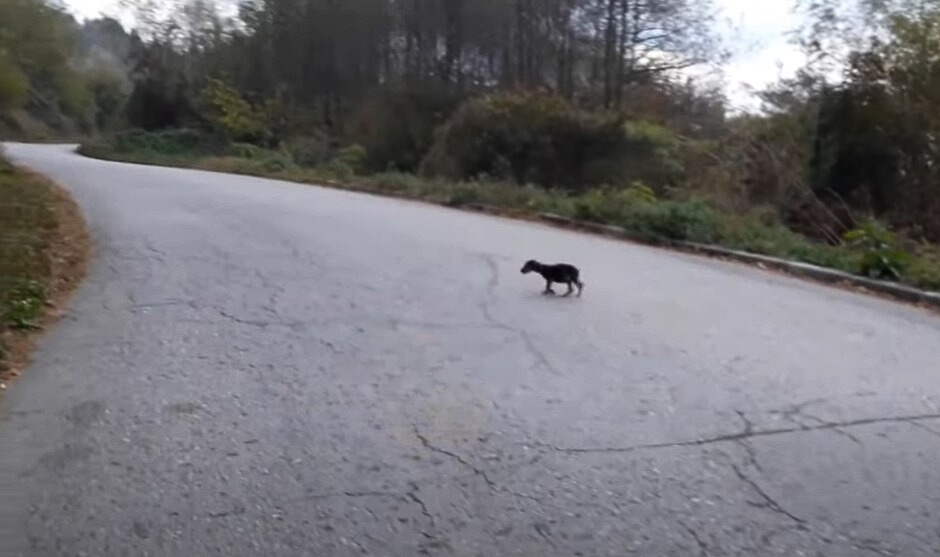
A kind-hearted rescuer was driving down the road when she spotted a scared little puppy.
The woman immediately got out of her car. Her heart sank after she saw the terrible state he was in. The fur baby was all skin and bones.
Although he needed help, the pup, later named Megan, started running away from his rescuer.
The kind woman talked to him, and Megan decided to put all her faith in her. He agreed to go with her.
His rescuer took him to the vet for a thorough medical examination.
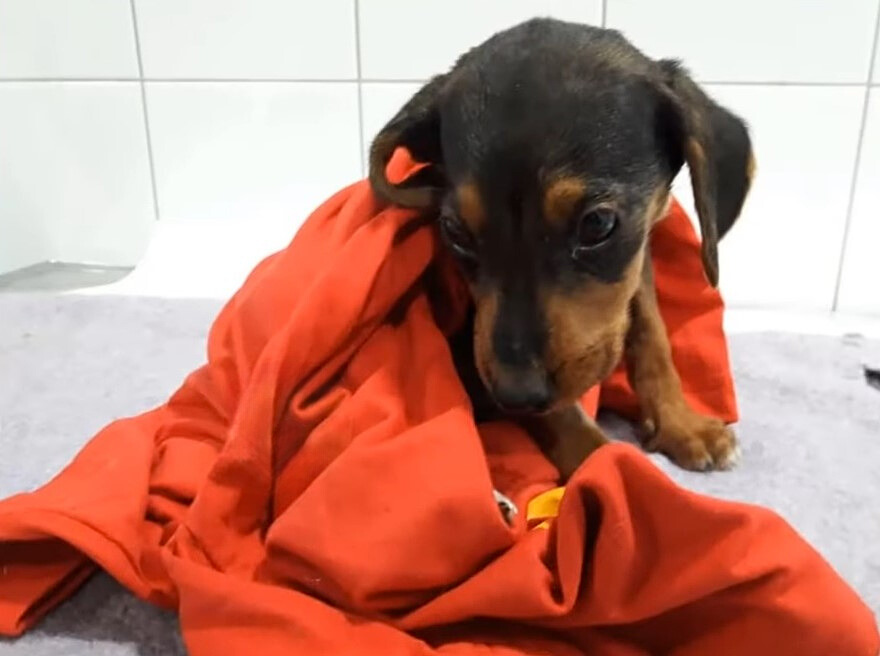
Since Megan was malnourished and his stomach was full of worms, the vet gave him the necessary treatment.
After the rescuer took him home, the pooch curled up on a blanket in his crate. He still felt scared.
Megan’s Road To Recovery
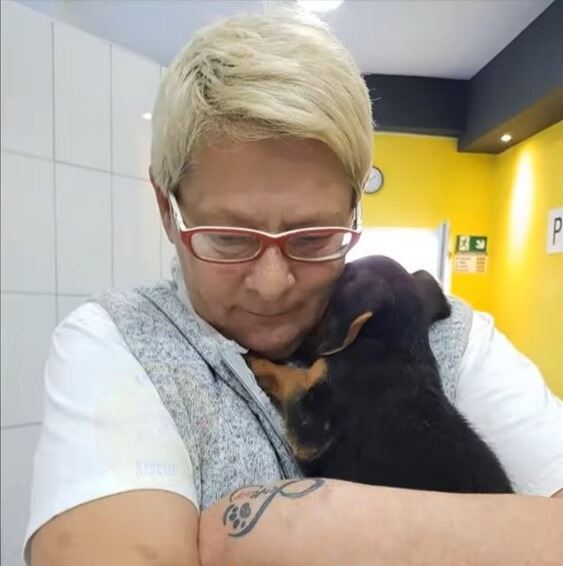
The woman hugged Megan and promised him that he would never be left alone again.
Thanks to the love and support she gave him, the puppy’s fears disappeared.
He slowly started gaining weight, and he felt better.
The pup began reciprocating love to his caregiver. He often licked her hands and covered her with kisses.
When Megan became more playful, his rescuer noticed that the canine moved with some difficulty.
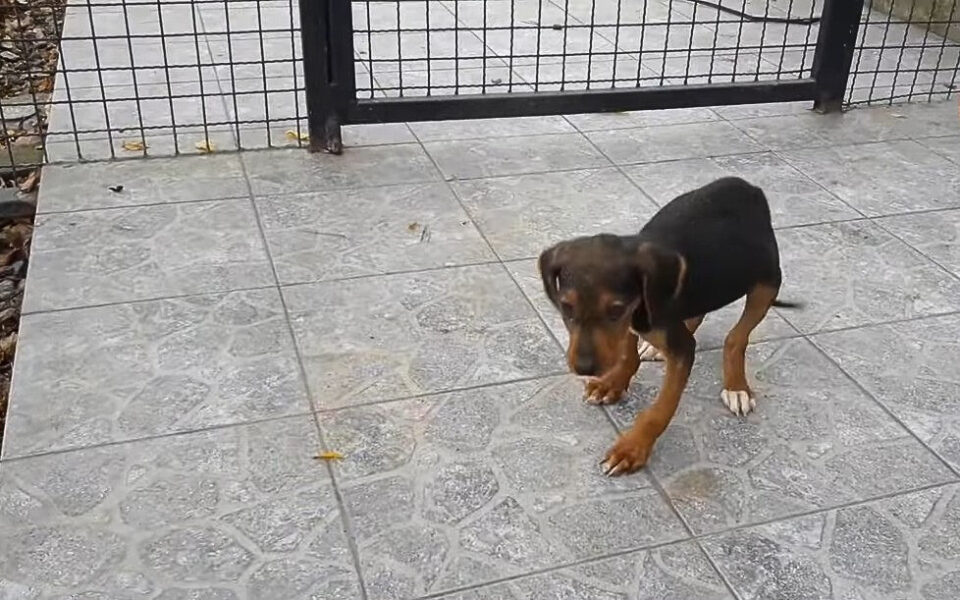
His fur became patchy.
She drove him to the vet right away. Megan was diagnosed with rickets – a condition caused by nutritional deficiency.
Luckily, the pooch was expected to make a complete recovery.
Megan felt delighted when he met another puppy in his rescuer’s home. The two pups played together, soaking up all the love the woman gave them.
Megan’s new fur started growing, and he continued thriving.
The Canine Wishes To Fulfill His Dream
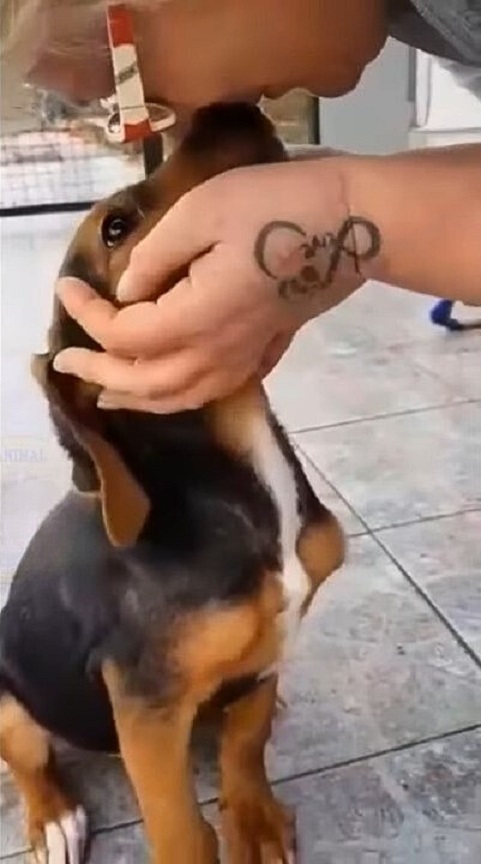
Two months later, the dog fully recovered.
Although the canine adored his rescuer, he dreamed of having his own family and a place to call home.
After some time, Megan received the best possible news. He was moving to his forever home.
Megan kissed his giant-hearted rescuer goodbye. He was grateful to her because she was with him during the most difficult period of his life.
Megan ran to the arms of his forever dad, who hugged him tightly. His biggest dream became a reality. He was ecstatic.
The adorable pup finally found his hooman who showered him with unconditional love.
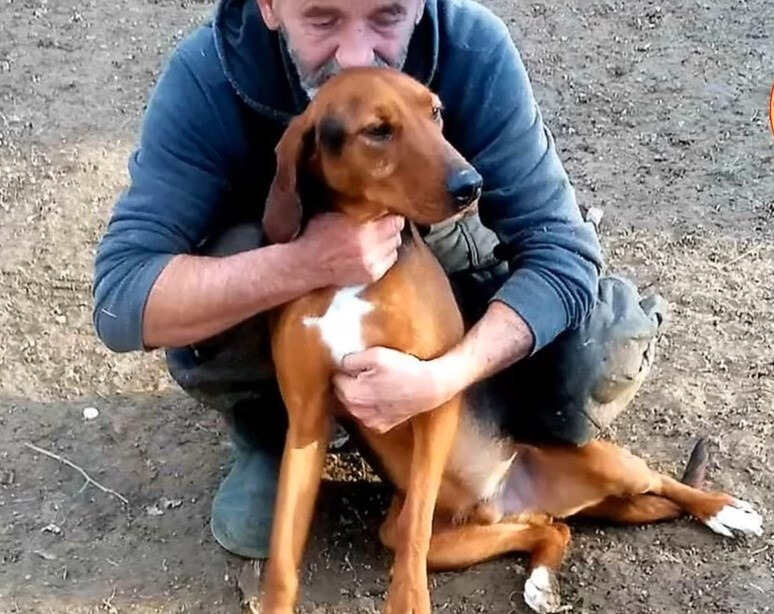
Love changed Megan’s life and helped him heal his broken heart. He forgot about his rough start, and he focused on his bright future.
Thank you to the wonderful human who extended her helping hand to the pup and helped him find his happy ending.
If you’ve ever noticed your furry friend obsessively licking their paws, you’re not alone. Dogs engaging in this behavior is a common sight that often leaves pet owners wondering what’s behind it. Paw licking can be a puzzling habit, but understanding why dogs do it can provide valuable insights into their well-being and behavior.
As a seasoned dog trainer, you’ve likely encountered this behavior in many of the pups you’ve worked with. While it may seem harmless at first glance, paw licking can sometimes signal underlying issues that require attention. So, the next time you catch your canine companion in a paw-licking session, there’s more to it than meets the eye. Stay tuned to uncover the reasons behind this intriguing canine behavior.
Understanding the Behavior: Why Dogs Lick Their Paws
The Basics of Canine Behavior
Dogs licking their paws is a common behavior that can be rooted in various reasons. One basic explanation is cleanliness. Dogs, like humans, groom themselves, and licking their paws is a way they try to keep clean. However, excessive licking can signify an issue that needs attention. It’s essential to observe your dog’s behavior to understand if there are any changes that could indicate an underlying problem.
The Difference Between Normal and Excessive Licking
Distinguishing between normal and excessive paw licking is crucial for your dog’s well-being. Normal licking is occasional, often part of grooming or scratching, and not obsessive. On the other hand, excessive licking is continuous, intense, and can lead to redness, swelling, or even sores on the paws. If you notice your dog excessively licking their paws, it’s best to consult a veterinarian to rule out any medical conditions causing this behavior.
Common Reasons Why Dogs Constantly Lick Their Paws
Allergies in Dogs
If your dog is constantly licking their paws, allergies could be the culprit. Just like people, dogs can be allergic to various things like pollen, certain foods, or even fleas. This allergic reaction can lead to itchiness, prompting your furry friend to lick their paws excessively. If you notice redness or inflammation, it’s essential to consult your vet to determine the specific allergy and provide appropriate treatment.
Parasites and Infections
Parasites and infections such as mites or yeast can cause discomfort to your dog, leading them to lick their paws constantly. These pesky organisms can irritate the skin, triggering the urge to lick. Regular check-ups and preventative measures can help keep parasites at bay. If your dog’s paw licking is persistent, a vet visit is crucial to diagnose and treat any underlying parasitic or infectious issues.
Dry Skin and Irritations
Dry skin or irritations on your dog’s paws can also be a reason for excessive licking. Harsh weather conditions, contact with allergens, or rough surfaces can contribute to dryness and discomfort. Ensure your dog’s paws are clean and moisturized, especially after walks or outdoor activities. Using paw balms or pet-safe moisturizers can help alleviate dryness and reduce the urge to lick excessively.
Pain and Discomfort
If your dog is experiencing pain or discomfort in their paws, they may resort to licking as a form of self-soothing. Injuries, splinters, or even arthritis can cause pain, prompting your furry companion to focus on licking the affected paw. Regularly inspect your dog’s paws for any signs of injuries or underlying conditions. Addressing the pain promptly with vet guidance can help alleviate the need for excessive licking.
Psychological Factors
In some cases, psychological factors such as stress, anxiety, or boredom can lead to excessive paw licking in dogs. Changes in routine, separation anxiety, or lack of mental stimulation can manifest in repetitive behaviors like paw licking. Providing a comfortable environment, engaging activities, and positive reinforcement can help reduce stress and anxiety levels in your dog, potentially decreasing the urge to lick their paws excessively.
Remember, understanding the reasons behind your dog’s constant paw licking is essential for their overall well-being. Regular monitoring, prompt vet visits, and appropriate care can help address underlying issues and ensure your furry friend stays happy and healthy.
Diagnosing Excessive Paw Licking in Dogs
When to Consult a Veterinarian
If your dog is constantly licking its paws, it’s essential to know when to seek help from a veterinarian. Schedule a visit if you notice any signs of redness, swelling, or if the licking is persistent. These could indicate underlying issues that need professional attention.
What to Expect During the Examination
During the veterinary examination for your dog’s excessive paw licking, the vet will conduct a thorough assessment to determine the root cause. This may involve checking for allergies, skin infections, parasites, or other medical conditions. Be prepared to provide details about your dog’s licking behavior, any recent changes in its environment, and its overall health history. The vet will work to identify the specific trigger and recommend a suitable treatment plan to address the issue effectively.
Treatment Options for Excessive Paw Licking
Medical Treatments for Physical Causes
If your dog is excessively licking their paws due to physical reasons like allergies or skin infections, your veterinarian may recommend medical treatments. This could include prescribed medications to alleviate allergies, such as antihistamines or steroids. For skin infections, your vet might suggest antibiotics or antifungal medications to address the issue at its root. These treatments aim to relieve the discomfort your furry friend is experiencing and help them get back to their normal paw hygiene.
Home Remedies for Mild Cases
In mild cases of excessive paw licking, you can try some home remedies to provide relief to your dog. One common approach is to soak your dog’s paws in a mixture of water and apple cider vinegar to help soothe any irritation. Additionally, keeping your dog’s paws clean and dry, especially after walks or outdoor play, can prevent further licking. Remember to consult your vet before trying any home remedies to ensure they are safe for your pet.
Behavioral Therapies for Psychological Causes
When excessive paw licking is triggered by psychological factors, such as stress or anxiety, behavioral therapies can be beneficial. Your vet may recommend desensitization techniques or behavior modification strategies to address the underlying emotional issues causing your dog to lick their paws excessively. Providing a calming environment, regular exercise, and mental stimulation can also help reduce stress levels in your furry companion, ultimately curbing their paw licking tendencies.
Preventing Paw Licking in Dogs
Regular Grooming and Paw Care
To prevent excessive paw licking, make sure to maintain your dog’s paws clean and dry. Trim the fur between the paw pads to prevent dirt and moisture buildup. Regularly inspect the paws for any signs of cuts, thorns, or foreign objects that might cause discomfort and lead to licking. Gentle cleaning with a damp cloth can help remove debris and prevent irritation.
Using Protective Dog Booties
Consider using dog booties when taking your furry friend for walks, especially in extreme weather conditions or rough terrain. Properly fitted booties can protect your dog’s paws from irritants like hot pavement, ice, or chemicals on the ground. This can reduce the need for excessive licking due to discomfort or injury, keeping your dog’s paws healthy and happy.
Establishing a Calm Environment
Creating a calm and stress-free environment at home can help reduce anxiety in your dog, decreasing the likelihood of excessive paw licking. Provide a comfortable resting area away from loud noises or high-traffic areas. Incorporate interactive toys, comforting blankets, or soothing music to help keep your dog relaxed. A peaceful environment can promote overall well-being and prevent behavioral issues that may lead to paw licking.
Conclusion
So there you have it, the reasons behind why your furry friend might be constantly licking their paws. Remember, keeping an eye out for any unusual redness or swelling is key to ensuring your pup’s paws stay healthy. By maintaining regular grooming and creating a stress-free environment at home, you can help reduce the chances of excessive paw licking. And don’t forget about those cute dog booties for extra protection, especially in harsh weather conditions. Whether it’s a physical issue or a behavioral one, seeking the right treatment is essential for your dog’s happiness and well-being. Stay vigilant, keep those paws clean, and give your pup all the love and care they deserve!
Frequently Asked Questions
Why do dogs lick their paws?
Dogs lick their paws to groom themselves, but excessive licking can be a sign of underlying issues like allergies or injury.
How can I prevent my dog from excessive paw licking?
Regular grooming, trimming fur, checking for cuts or foreign objects, using protective dog booties, and creating a calm home environment can help prevent excessive paw licking in dogs.
What should I do if my dog is licking its paws excessively?
If your dog is licking its paws excessively, consult a veterinarian to determine the underlying cause. Treatment options may include medical treatments for physical issues or behavioral therapies for psychological causes.
[no_toc]

Hey there, I’m Janet Brooks, a dog-loving student from California. I’m all about helping pups in need, especially those without homes. Me and my awesome friends work together to give shelter and love to stray dogs. Oh, and I also write blogs about dogs to share helpful info.